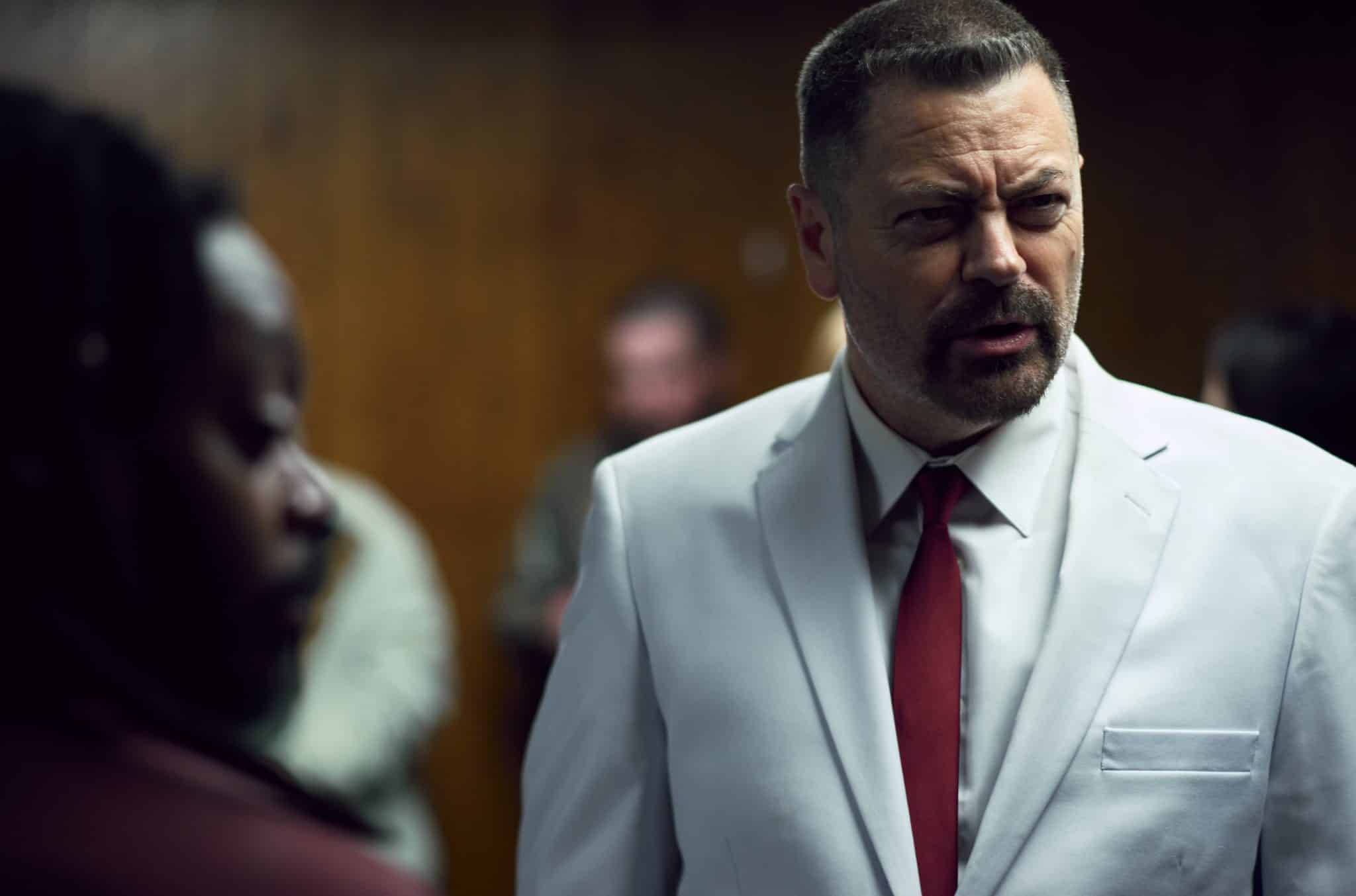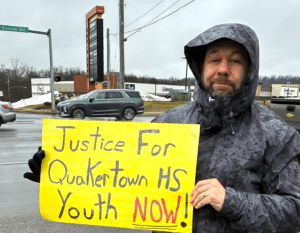Few directors come out with such an important and stunning film with their debut as Christian Swegal has with Sovereign. It’s truly a risky movie – taking a beloved actor such as Nick Offerman (Parks and Recreation) and making him into a conspiracy-addled gun-toting cop-killer.
But there’s so much more to Sovereign.
The film follows Jerry Kane and his son Joe on an unfortunately now all too familiar descent from believing in right-wing conspiracies to a shoot out with police. The film portrays a real life incident from 2010 that ended in tragedy, but it also offers insights into today’s political realities.
Swegal, who wrote and directed the film, truly went down the rabbit hole while researching for it – watching videos of the real life Sovereign Citizen salesman Jerry Kane, talking to the police that took him in, and reading academic papers that were written on the killings.
Sovereign is one of the best films I’ve seen this year, serving award-worthy performances by Offerman, Jacob Tremblay and Martha Plimpton. Director and writer Swegal begs the audience for empathy for the people that go down the truly lonely road of being a sovereign citizen – but his film doesn’t for a moment forgive them. This isn’t a film that platforms or gives the sovereign citizen movement a pass – if anything it’s a damning portrayal of the conspiracy addled desperate lives of the people that fall into this grift (and that’s what it is).
The film, now in theaters and streaming, while placed purposely outside of the Trump years in 2010 shows that the January 6th mindset didn’t start with the president and certainly won’t end with him either.
INTERVIEW
What drew you to make a film about sovereign citizens?
Without getting into too much detail, I had a family member who, because of a mental health problem, became really heavily involved in anti-government, you know, anti-everything. Kind of QAnon-ish. And so in trying to understand that, I started researching these topics and researching a lot of the jargon I had heard led me to sovereign citizen stuff. And then in researching the sovereign citizen movement, I came across this case [of Jerry Kane]. Immediately the father/son story at the center of it between Jerry and Joe Kane and the idea of doing a coming of age film, really from the perspective of a teenager growing up in this environment, it felt really compelling to me.
It felt almost like a documentary. Talk to me a little bit about what kind of research you did.
So I think the personal experience was really the thing that let me kind of understand the human aspect of it and maybe some of the motivation and the drive behind reaching towards some of these things. Jerry Kane had been going around the country giving these lectures with his debt reduction seminars. I was able to get video of a lot of those, there’s a lot of his language that’s actually in those speeches that are in the film. There was also some great academic research, PhD thesis papers written on this case as a study in extremism.
So there was quite a bit of research of police records I was able to get access to. And then on the police side of the story, the Dennis Quaid storyline, [all of] the names have been changed and has been fictionalized. We had contact with some of the police that were involved in this early on. Their sort of initial hesitation was they were nervous that Hollywood was coming to town to make a hit piece on police or something, and they didn’t want to be in it. And I think as soon as we explained that that’s not what we were doing [that] we were trying to be very objective and not editorialize with this film. We had full support of the police in Arkansas, and [with] the families were really just trying to respect their privacy, to the degree that we could while telling the story.
The film doesn’t judge, but it also certainly doesn’t forgive. What do you think that people really hope to get from this film if they’re watching it beyond just a compelling story?
Well, I think a lot my favorite films of the 70s really ask questions rather than try to try to deliver a main thesis or an answer. The movie is kind of the start of the conversation rather than the end of the conversation. I think it’s a lot more of an active viewing process. I think the question is what was the message of this? Broadly speaking, the message is empathy and trying to mirror as accurately as we can, something real that’s happening in the world.
Let’s set this movie in a part of the country that really exists and try to reflect it as accurately as possible. And then let’s try to tell the story about the people at center of this and understand their motivations as clearly as possible. I don’t think it’s a political message as much as a human message to say, these are complex systems at work.
READ: Sovereign Citizens: More Than Paper Terrorists
You can sort of see these systems at work in our country and in the movie, hopefully accurately reflected. And, I think putting our dukes down to a degree or trying to be empathetic is a starting point for a conversation. So that’s sort of the main message. But in terms of obvious there’s themes of gun culture, masculinity, fathers and sons.
This is a movie about how we teach men [to] have this sort of a drive towards authoritarianism in a way, on both sides of this spectrum, whether it’s the establishment or the anti-establishment. It’s about feeling that you have a lot of men, I think, in this country that feel very disempowered.
That’s not just men. There’s a lot of people that feel disempowered.
You could have placed this in modern day, obviously the story is based on a real incident, but was that just never a conversation?
I think there were a number of reasons for us thinking that that was the best choice. I think one that was accuracy. The other is it felt near enough in time that it didn’t feel super period in a way. You know, there was still the internet, it’s not that the world wasn’t so different. 2016 was such a sort of a fork in the road.
It’s interesting because it is right after the 2009 financial crisis.
Yeah, exactly. That was another big reason.
The desperation in all of those people and those American Legion wood-paneled rooms during Jerry’s talks – normally you might have a narrator if this was a documentary stating something on statistics … but you don’t need it.
You can see right off the bat why these people are listening to this. The insanity about, “pounds, ounces and dollar bills.” When you step back from sovereign citizen talk, it’s lunacy.
Yeah, absolutely. I think what I found in my personal experience and also in the research was that many of the people drawn to these types of movements, the answers they arrive at are like you said, pretty crazy. I don’t understand another way to say it, and in some cases, really crazy. It is actually some sort of psychosis. But you know, I think they’re arriving at the wrong answers. But if you trace back the grievance that, or the injury they felt is really valid.
People who were denied insurance coverage that they were due, or filed their taxes wrong and then they were hit with a wave of penalties that put them underwater. I think without a responsible and compassionate official response to that, you leave a vacuum where a guy like Jerry Kane steps in and has a message of empowerment, [it] makes people feel that they can have courage and fight back. And that’s really seductive and dangerous.
Casting Nick Offerman is almost a risk because he’s typecast in an opposite way at this point. He did Parks and Rec and Last of Us where he had an arc. He’s so beloved. He also has recently spoken out specifically saying that his character in Parks and Rec is not the MAGA right-wing some have come to think of it.
Nick is nothing like that in real life.
What was that like, working with him and convincing him to take this role?
Christian: My experience with him is that he’s a person who cares deeply about people. He really is not a judgmental person. He really cares about putting art out into the world that he feels can make a difference. He’s incredibly empathetic.
I have a suspicion for why he’s drawn to those types of roles. But in terms of my interest in art, our team’s interest in casting him, it’s funny, I’ve now gone in and discovered Parks and Rec and I love the show, but that actually wasn’t my introduction to him. It was sort of a benefit, weirdly. We cast him before he was in The Last of Us, and that was just a really happy surprise that happened for us. I’d seen him in Devs, that series of Alex Garlands, and I thought he was brilliant in that. I just felt like Nick has this incredible everyman quality to him.
He has that traditional, masculine, rough way about him, but he also has a beautiful sensitivity. And those two things are opposite, really. We knew that this character had to play a loving father. We had to believe the love there and then. He also had to be dangerous. And, that’s a really unique quality, I think, to find in an actor. And I think Nick really, really embodies that and pulls this role off.







